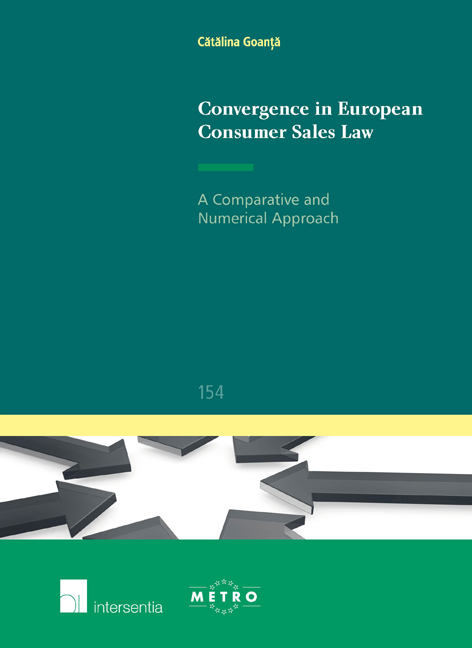Book contents
- Frontmatter
- Dedication
- Acknowledgements
- Contents
- List of Abbreviations
- List of Tables and Figures
- Chapter 1 Introduction
- Chapter 2 The Substantive Comparison
- Chapter 3 The Numerical Analysis
- Chapter 4 Conclusions and Recommendations
- Summary
- Valorisation Addendum
- Relevant Documents
- Bibliography
- Other Literature
- Curriculum Vitae
- Ius Commune Europaeum
Chapter 3 - The Numerical Analysis
Published online by Cambridge University Press: 13 December 2017
- Frontmatter
- Dedication
- Acknowledgements
- Contents
- List of Abbreviations
- List of Tables and Figures
- Chapter 1 Introduction
- Chapter 2 The Substantive Comparison
- Chapter 3 The Numerical Analysis
- Chapter 4 Conclusions and Recommendations
- Summary
- Valorisation Addendum
- Relevant Documents
- Bibliography
- Other Literature
- Curriculum Vitae
- Ius Commune Europaeum
Summary
The previous Chapter focused on discussing specific transposition issues of the consumer acquis in the national laws of seven Member States: Belgium, France, Germany, Ireland, the Netherlands, Romania and the UK. The central purpose of this comparative analysis, in line with the vast majority of writings covering the topic, was to provide a starting point for the exploration of factors that influence convergence. This Chapter focuses on the following points: in Section 1, the aim of the Chapter is presented together with a brief overview of previous work that is of interest for this study. Next, Section 2 explains the methodology leading to the creation of the Convergence Index, the novel tool this study aims to contribute with in measuring the legal convergence resulting out of harmonisation policies. On the basis of this methodology, Section 3 focuses on gathering data from the five directives and their transposition in the laws of the Member States as described in the previous Chapter. Section 4 uses the aforementioned data to ‘code’ values for the Convergence Index, and finally, Section 5 presents some preliminary conclusions.
Aim of the Chapter and Background in Previous Work
As comprehensive as descriptive analyses on the harmonisation of consumer law are, one perspective of this discussion remains under-represented in literature – the need to empirically measure the said harmonisation process. Previous works such as the compilation of the Consumer Law Compendium, or directive-oriented implementation studies are of tremendous help in understanding how European law is integrated into national legal systems. Accordingly, these studies look at contract law directives in a targeted manner and address legal issues in detail. However, apart from executive summaries and comparative tables, no other tools are used to highlight the overall findings of these comprehensive studies. The present research aims to fill this gap and contribute to the current framework with a comparative approach that looks at harmonisation in a cross-directive/crosscountry manner and evaluates the process on the basis of pre-determined factors, in order to measure its converging effect.
- Type
- Chapter
- Information
- Convergence in European Consumer Sales LawA Comparative and Numerical Approach, pp. 161 - 294Publisher: IntersentiaPrint publication year: 2016



